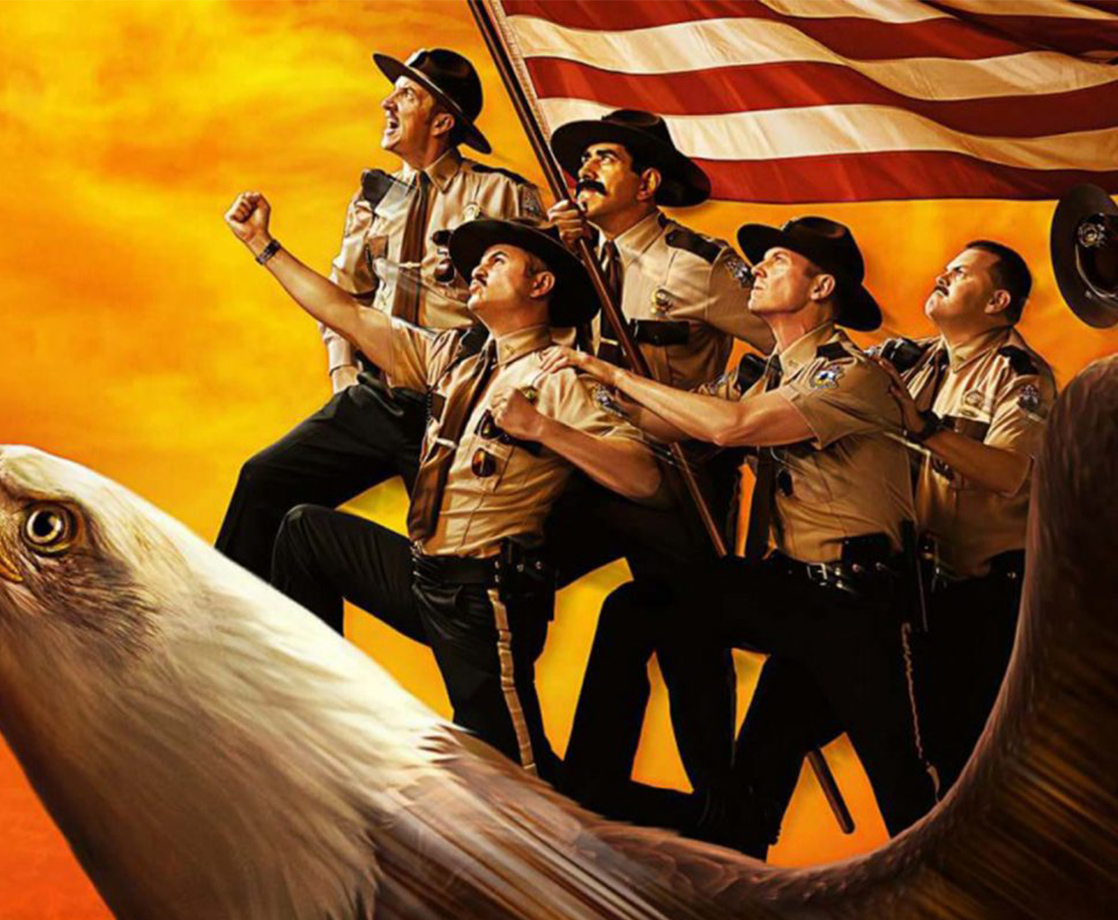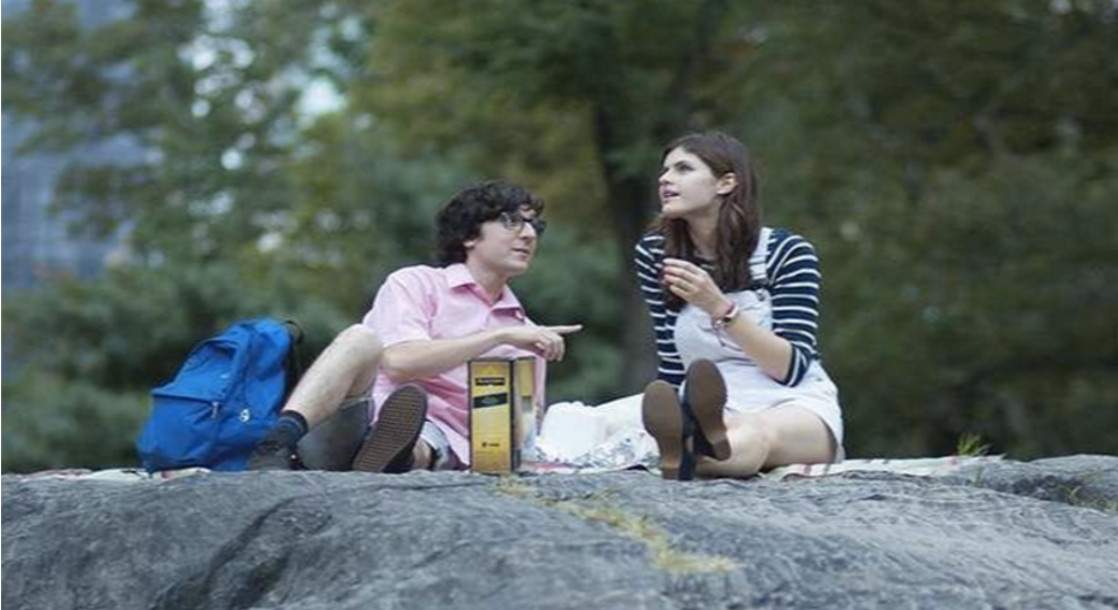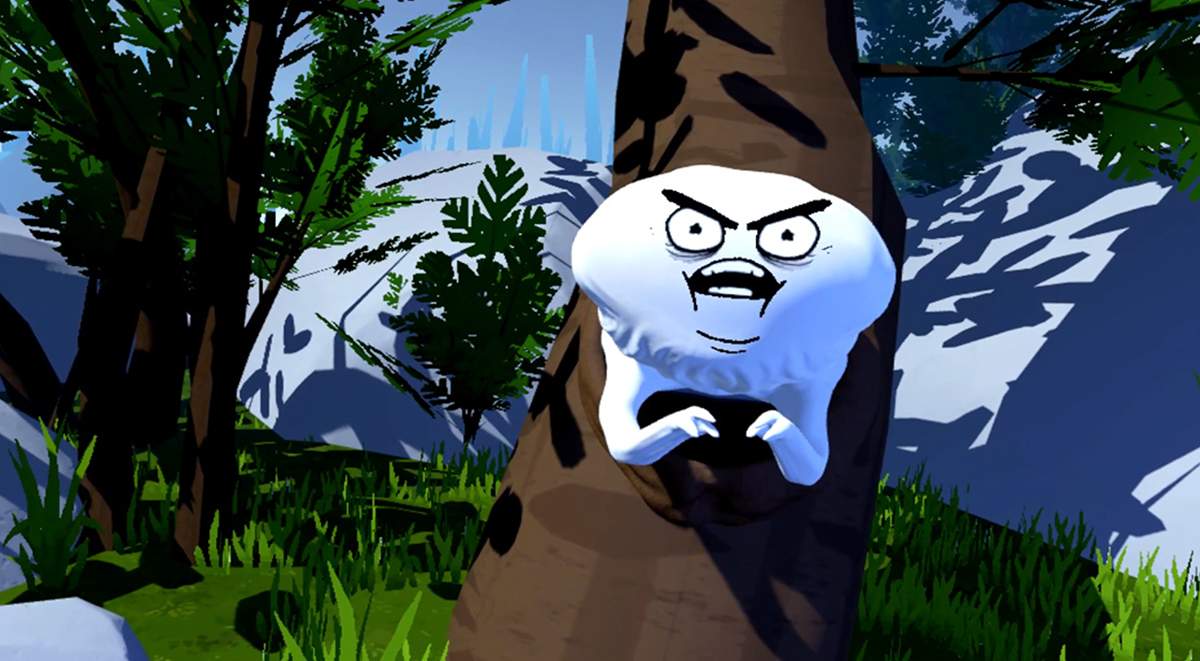The state of Hollywood is, like most things American, gently teetering towards oblivion. Box office tallies are higher than they have ever been, but whatever it is the silver screen is settling into, the center will not hold. For every movie that would once have pulled in decent returns on a mid-range budget, there is now unrealistic expectation; only Hollywood could manage to convince you that a $650 million gross is a disastrous flop.
That's the commerce; what about the culture? It should be understood that there are entire strata of film that Hollywood is no longer interested in making: mid-tier adult dramas shunned in favor of franchise-driven fare; romantic comedies that don't stand a chance of passing the Bechdel test. Some of this feels like necessary spring cleaning, yet the state of the stoner comedy sits somewhere in between. While watching Super Troopers 2, you might ask yourself "how did this get made?" but you would have only your fellow pot smoker to blame.
Super Troopers 2 was a crowdfunded exercise in franchise-making, and the results don't really matter all that much. This film materialized in the kush cosmos, one of those blessed moments in which stoner intention successfully met up with practical follow-through: a fully completed highdea, if you will. Jah bless, IndieGoGo. Fan service doesn't even begin to cut it; this is fan manifested — fanifested — and somehow the film's shoddiness feels like it bares the marks of a lot of hands. The film was written by the Broken Lizard comedy troupe, but it teeters on something like cultural groupthink, a kind of filmic F.U.B.U.
Super Troopers 2 went through a number of conceptual iterations over the years, initially pitched in 2006 as a '70s-set prequel, with the original cast returning to play their own fathers. In 2009, director Jay Chandrasekhar announced that the sequel would instead be set right after the original, and would follow the troops as they work undercover at a lumber factory that's been the site of eco-terrorist activity.
Now, in its final iteration, Super Troopers 2 picks up several years following the events of the first film. After being fired from the Spurbury Police Department, the boys are brought back into the fold when it's revealed that a section of Canadian land bordering northern Vermont was geographically mislabeled, making it U.S. territory in desperate need of temporary policing. Soon, the titular troopers find that someone from Canada is utilizing the legal loophole to smuggle drugs across the border, hiding it in the Vermont town and waiting for the delineation point to shift back to Canada, cutting out the whole "smuggling" part.
It's a ludicrous concept for a ludicrous movie, one that literally ignores the 17-year gap between the original film and the sequel. The ages of the characters are all but meaningless, aided in no small part by their continued immaturity; if more than 15 years have passed since we last saw the gang, they seem to know nothing of it. Kevin Hefferman's Trooper Farva remains a ballistic missile of flatulence and bad behavior; Trooper Thorny, played by director Jay Chandrasekhar, endures and co-authors a host of brown-skinned stereotypes.
And this is still an all-boys affair. Dick jokes abound giddily. By refusing to acknowledge the nearly-two decades since the original film, Super Troopers 2 feels ripped right out of the past, down to its very sensibility. And stoner sensibility has always been imbued with a kind of boyish adolescence: care-free, good natured, even if not always well-mannered. That's always been where these sort of genre films have felt most comfortable setting up camp, even when the cultural topography has dramatically evolved around it.
In a crucial scene in Super Troopers 2, the officers find themselves face-to-face with a dilemma involving a bear in the police station. It's just the kind of "in-over-their-heads" predicament that stoner movies thrive on. Bill and Ted find themselves traveling through time and space; Harold and Kumar turn a simple fast food run into an all-night adventure; Method Man and Redman get accepted to Harvard thanks to an IQ-raising weed strain.
Much of stoner cinema began in close proximity to coming-of-age stories. Films like Fast Times at Ridgemont High and Dazed and Confused manage to find footing in the center of the stoner/teen movie venn diagram. Yet recently, the genre has metastasized into something else, leaving the adolescent discovery stage of high school, and entering the nebulous period of, I suppose, late-blooming adulthood.
For the past decade, Seth Rogan and the Apatow gang have all but laid claim to the stoner comedy genre, turning weed into a proxy for a kind of arrested development. The result has often been surprisingly conservative: growing up means what it has always meant, and a legitimized, hyper-hetero life includes a wife, a family, and, most crucially, a smoke-free existence.
All of which is to say that Super Troopers 2 feels both right on time and hilariously apart from it.
For all of its failures as a movie — and there are many — Super Troopers 2 is divinely committed to a kind of archaic idea of adolescent humor, taking us back to the more slapstick minded antics of Cheech & Chong, whose own Up In Smoke turned 40 earlier this month. In their heyday, Cheech & Chong were pioneers of a genre that had no name, taking the hippie sensibility and fusing it with the work ethic of a road comic. Their flicks helped bridge the gap between the old school sensibility of club comics and the interests of a burgeoning counterculture, and their racial status helped propel a different vision of American stonerism (a torch most readily passed to Harold & Kumar).
Super Troopers 2, meanwhile, feels in conversation with recent history almost entirely by accident. The film is off-color enough to elicit eyerolls or outright groans from the tenderest amongst us (Thorny's ethnic background is often played for laughs, identified as everything from Indian to Latino), but one can immediately tell that this movie has its sights on something smaller. It doesn't want to offend; it barely wants to make you think. Much of the film plays on a kind of undercooked metaphor for our times, one about the arbitrariness of borders and the simmering tension between the troopers and the Canadian police force: this time, it's the Americans coming into town and taking jobs.
So where does the stoner film go from here? Super Troopers 2 feels simple in taste and even its expectations, but it lands on the heels of interesting times. After a decade of gradual legislative progress and policy reform, marijuana is on the precipice of full mainstream acceptance. Nearly 90% of the country now supports medical marijuana use. Eight states and the District of Columbia have legalized recreational use, and even more states are expected to embrace the adult-use market by the end of 2018. In Colorado alone, tax revenue collected from legal cannabis sales reached nearly $250 million dollars in 2017. This has not gone unnoticed by one-time opponents; earlier this month, former Speaker of the House John Boehner joined the board of directors at Acreage Holdings, one of the nation's largest multi-state cannabis corporations, stating that his thinking on the drug has rather conveniently "evolved."
Boehner has evolved; will the movies? Or will they go somewhere else entirely? Films like this year's Gringo take the chaos inherent to the stoner genre and up the ante for the almost-legal age. In that movie, a mass-produced "weed pill" has turned a company into a profit machine, making it the ideal target for an insurance scheme gone wrong. The foibles that follow are classic stoner flick missteps, but they exist in a new hyper-corporate context; out of the street corner and into the corner office.
Television has become a new frontier for serialized dramas, and cable's historically laxed censorship policies has made it the premiere space to push, beyond sex and violence, radical new depictions of illegal substances. Sometimes the results prove to be reductive: Netflix's Disjointed adopted the network sitcom multi-camera format, but refused to radicalize it in favor of maximum palatability; call it The Big Bong Theory. Yet elsewhere, television shows like Atlanta present weed as both ephemeral and vital, so ingrained is it in daily life. That kind of assumed presence, as foundational as morning coffee, feels radical only in the sense that it successfully depicts life as it's lived, not written. The show's artistic ambition and narrative flexibility both seem informed by weed, if not maybe even enhanced by it. As Tad Friend elegantly put it in his recent New Yorker profile of Donald Glover, "Just as John Cheever's epiphanies and apologias were stamped by drink and Paul Bowles's hallucinatory quietude by hashish, so Atlanta's vibe is molded by weed."
HBO's High Maintenance has brilliantly used weed as fulcrum or connecting thread in a city full of isolated stories, with snapshots of urban life vacillating between minutia and the profound. The only constant, episode-to-episode, is the dealer himself, biking throughout New York City's boroughs and known only as The Guy. As social and corporate interest in weed intensifies, maybe our POV will switch from the man-children doing the buying to the hustlers doing the selling. Super Troopers 2 makes getting high look like it always has — silly, fun, and irreverent — and it feels as if it's in constant conversation with a dormant teenage self. The sequel is time capsule more than a reefer redux. It's been over 15 years since we first got hipped to "snozzberries," and those cops are still laughing. Meanwhile, The Guy is biking, and we don't know where to.
Follow Rod Bastanmehr on Twitter











